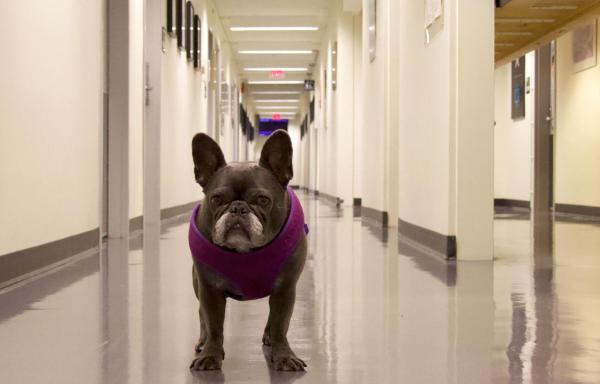Guest post by Marie Erikson, fourth-year Bachelor of Arts, Philosophy Honours student
Bringing a dog to the beach or on a walk is common, but you may not expect to find one in an academic setting.
Members of UBC’s graduate and postdoctoral community are supporting their research and wellbeing by bringing their dogs with them to campus. With careful consideration of the needs of their dogs and people they interact with, these community members find that engagement with dogs can support success in academic work.
We spoke with some UBC researchers to hear how dogs positively impact their work.
Chelsea Gowton, a PhD Candidate in Plant Science in the Faculty of Land and Food Systems, started bringing her “half adorable, half sweetheart” dog Juniper with her to work during her master’s.
“It was really great to be able to bring her with me to campus so that I didn't have to abruptly stop experiments and go home to take care of her,” said Gowton, who also emphasized the benefit of taking quick, intentional breaks with Juniper in an interview.
Nowadays, Gowton only brings Juniper to work occasionally, allowing them both a chance to relax with a long walk through Pacific Spirit Park.
Chelsea Gowton’s dog Juniper, image courtesy of Chelsea Gowton
Taking a break with one’s dog is also important for Katie Koralesky, a postdoctoral teaching and research fellow in the UBC Animal Welfare Program and Faculty of Land and Food Systems. Koralesky brings her dog Finn to work once a week, which she says is enjoyable for him and helps her take breaks.
“Walking with Finn helps me reset or think through something I'm working on or writing,” said Koralesky. Because her research explores the influence of human factors on and the role of policy in improving animal welfare, she finds that Finn also prompts reflection on the types of relationships between people and animals. Koralesky is also inspired by her 13 years of experience volunteering in animal shelters with both animals and people.
Katie Koralesky’s dog Finn, image courtesy of Katie Koralesky
Lexis Ly, a PhD candidate with the Animal Welfare Program has been volunteering with BC SPCA’s pet food bank and Community Veterinary Outreach throughout her time in graduate school. Her volunteer work also provides her with a chance to recharge.
“It's really nice to get to connect with my community in that way. On top of that, it does kind of fulfill a hole in my heart for not having my own [dog],” said Ly.
After our interview, Ly adopted a cat named Boo, who has been “wonderful company” while Ly writes her thesis.
Volunteering has also motivated Ly’s research on programs that prevent rehoming of animals and keep animals out of shelters when animals do need to be rehomed. She emphasized that not enough people see animal shelters as resource hubs, and that her volunteer work allowed her to see the impacts of the programs she researches.
Lexis Ly’s cat Boo, courtesy of Lexis Ly
As much as dogs can improve the wellbeing of humans, it is crucial to consider the wellbeing of dogs engaged to support human health, emphasized Camila Cavalli, a postdoctoral research and teaching fellow also in the Animal Welfare Program. Cavalli researches how Animal Assisted Interventions, short visits of animals to institutions like schools or hospitals, can be stressful for dogs and how dogs can choose how they want to interact during these interventions. Even though these dogs are screened for suitability, they may follow a handler’s instruction to participate regardless of their wants and comfort.
Though Cavalli acknowledged that some dogs may do well and adapt to a workplace environment, she explained that her high-energy dog Kira is best off staying home most days since she struggles to relax in the office.
Camila Cavalli’s dog Kira
“She's not truly resting, like waiting to see if someone comes or something, so I know that it's more of a treat for her to come here, but I wouldn't bring her that often because I think it can be a bit stressful for her.”
Cavalli also sees dogs as a great icebreaker for people who like dogs but understands that many people are allergic to or uncomfortable with dogs.
“Of course, Kira would like to lick everybody's faces, but some people may not want to be licked by Kira,” said Cavalli.
The comfort levels of others are extremely important to consider for Sheri Pak, Graduate Advisor in Ancient Mediterranean and Near Eastern Studies, who brings her French bulldog Lilly to the office some days.
“The preferences of people we interact with is the number one thing,” said Pak, followed by Lilly’s feelings. Mindful of others’ comfort and department policy, Pak confirmed with all members of the department before bringing Lilly, keeps her in her office and has someone else watch Lilly or leaves her home when meeting with students uncomfortable with dogs.
Sheri Pak’s dog Lilly
Because much of her work involves supporting graduate students in managing their degrees, Pak found that having Lilly around helped her and faculty become hyper-aware of student stress and how even little things can help students through intensive academic periods. Lilly has also become widely appreciated within Ancient Mediterranean and Near Eastern Studies and even by people in other departments who stop by specifically to see Lilly.
“It's been really positive. I mean, positive to where they can't imagine Lilly not being here; they know her hours.”
If you are a graduate student interested in spending time with dogs, consider checking out volunteer opportunities through the BC SPCA. Be sure to also keep an eye out for dog therapy sessions on campus, often run through individual faculties.





